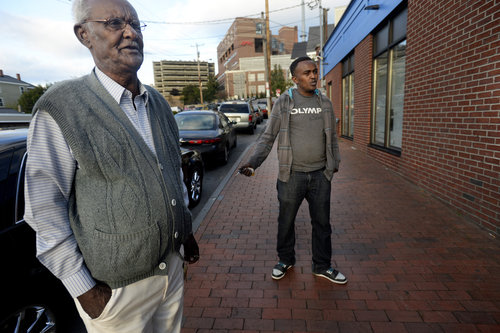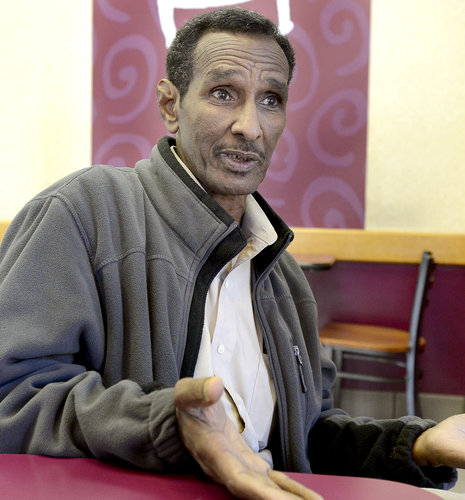PORTLAND — Somali residents of Portland said Monday that they have seen no evidence of terrorist groups such as al-Shabab trying to recruit members in Maine’s largest city.
Two days after the group killed at least 62 people in an attack on a shopping mall in Nairobi, Kenya, Somalis in Portland said it makes no sense, for people who fled their homeland to escape violence, to participate in terror.
“I hate (al-Shabab) and I don’t want to hear about them,” said Issa Adaan, 29. “This city is our city and I love it.”
But some Somali elders who were interviewed said they have heard that terrorist groups such as al-Shabab prey on young men in the United States who are homeless, high school dropouts or addicted to drugs because they are the people most vulnerable to recruitment.
Many expressed concern that news of Saturday’s terrorist attack in Kenya will harm the Somali community in Maine, increasing the discrimination that it already endures.
Adaan, who came to the United States in 2010, said his mother and brothers are living in a refugee camp in Kenya and he hasn’t seen his mother in 10 years.
Adaan was one of about 40 Somali men who gathered Monday night at the Portland Halaal Market on St. John Street.
Some gathered on the sidewalk outside the market while others went into a back room, where they watched a CNN television report on the situation in Nairobi. The men meet in the room each night to socialize, watch television and play cards.
Sunday’s news that a Twitter feed purporting to belong to al-Shabab named a person in Maine as being involved in Saturday’s attack has Somalis bracing for everything from racial profiling to hate crimes, their representatives said.
The report was particularly disturbing to Badr Sharif, 24, who is majoring in international relations at the University of Maine.
“Things like that can happen but it is unconfirmed. Spreading rumors can bring great harm to our community,” Sharif said.
The FBI, state and local officials said they are still investigating whether the information released via Twitter is accurate, but Somalis in southern Maine said they are familiar with al-Shabab and can’t imagine why anyone who made it to the U.S. from war-torn Somalia would get involved with the group.
The Twitter feed has been disabled, but not before it identified one person as being a Somali from Maine. The Portland Press Herald is not publishing identities of the alleged attackers because it could not independently verify them.
Hussein Ali, 70, said he has been living in Portland for 10 years. He said, “I don’t think any Somalian living in the United States is happy with what happened in Kenya.”
Ali said he was surprised when he heard a media report that al-Shabab was recruiting members from Portland. He said he believes that the terrorist organization is targeting young men who are destitute.
Ali said he has never heard of or seen anyone from al-Shabab trying to recruit members in Portland.
Mohammed Dini, executive director of the African Diaspora Institute in Portland, said in a prepared statement that repercussions from multiple unsubstantiated news reports can harm the Somali community.
“Though incredible progress has been made integrating new Mainers over the past decade, rumors can still easily become the single story by which we are defined in Maine,” said Dini, who is from Somalia. “Reporting based on speculation directly impacts the everyday lives of immigrants in our communities.”
Dini said young Somali-Americans still are called “terrorists” and told to “go back home” by strangers on the street, even if they were born in the United States or have spent most of their lives in Maine.
Dini said he has not heard of or seen any recruitment by al-Shabab in Maine.
Mohamud Yusuf, a University of Southern Maine student from Somalia, said he has never made it through a Transportation Security Administration checkpoint at an airport without being subjected to a “random” search.
“I get picked out of the line every time,” said the 24-year-old Freeport resident, a senior in international studies and political science whose family left Somalia 20 years ago. He hasn’t been back since.
Hashim Noh, a Somali native who was with friends Monday outside the Portland Halaal Market, said they were waiting to learn the truth about the mall attack.
Noh said al-Shabab is universally disliked by the local Somali population.
“They are bad. They killed many people,” he said, referring to the country’s civil war, which has lasted more than two decades and driven more than a million Somalis from their homeland.
A man who was with Noh, wearing a traditional tunic and kufi cap, got agitated, waving his arms and speaking emphatically.
“He says al-Shabab set his village on fire,” Noh translated.
Ahmed Hassan, an elder in Portland’s Somali community, said it’s impossible to know whether a single, misguided youth from Maine might have been manipulated into participating in the attack.
Still, he said the actions and goals of al-Shabab do not represent those of the Somali-American community.
Given the pain, suffering and loss most Somali refugees have endured, he said, the last thing they would do is support terrorism.
“An adult person who sacrificed and crossed borders and went to refugee camps, I don’t think he’s going to buy into this idea,” Hassan said.
Reza Jalali, USM’s multicultural student affairs coordinator, who works closely with the local Somali community, said Somalis are concerned about the allegations.
“They are quite shaken, they feel quite vulnerable. They are quite scared,” he said.
Jalali said he spoke with Somali students Monday who said they haven’t heard anything beyond what was reported in the media about possible al-Shabab recruitment in the Portland area.
“They think it’s possible that it could have happened elsewhere,” he said.
The allegation that Portland is a terrorist recruitment center for al-Shabab dates back to at least March 2009, when an FBI report cited Portland as one of several U.S. cities where members of Somali immigrant populations might be vulnerable to recruitment by the al-Qaida-linked group. Other named cities included Minneapolis-St. Paul, San Diego and Seattle, all of which have large Somali populations.
As of 2012, there were about 6,000 immigrants from Somalia in Maine, including about 1,000 members of the Bantu ethnic minority group.
Jalali, an expert on immigrants in Maine, said most of the state’s Somali-born residents came to the U.S. as part of a refugee relocation program that began in the early 1990s.
Maine is one of the few states that accept refugees, he said. Others include Minnesota, where the greatest number of Somali refugees live, and Georgia, Jalali said.
Many of the Somali refugees in Maine originally were placed in other cities but moved to southern Maine because of its low crime rate, relatively affordable housing and tolerant view of foreigners, he said.
The allegation that al-Shabab has tried to recruit Mainers has been repeated several times since 2009 in blog posts and online news articles, especially after the arrests in 2010 of several people in Minnesota, California and Alabama on charges of providing support for al-Shabab.
There is so far no evidence beyond the recent tweets to support the idea that al-Shabab was successful in recruiting someone from Maine.
Regardless of whether the allegation is true, Jalali said, it’s important for those outside the refugee community to remember that al-Shabab is a fringe group and does not represent typical Somali views.
“As an advocate for the community, I’m just concerned about their safety,” he said.
Hassan said it’s important for Portland’s Somali leaders to maintain a dialogue with the FBI and Department of Homeland Security officials, to quell any suspicions that the community’s young people are being groomed for terrorism.
In the past, federal law enforcement has relied on Somali elders in Portland to be its eyes and ears in the community, Hassan said, but those interactions have decreased in recent years.
“We don’t want them to think we have Koranic training camps where we train them,” he said.
The culture of terrorism is a foreign culture that has infiltrated Somalia only since the war began, Hassan said. “This was never a culture, a value, in Somalia before the civil war.”
Noh said that if he ever learned someone in the Portland area was recruiting for al-Shabab, he would go straight to the police.
“Someone who does that wants to die,” he said. “They want to take someone with them.”
— Staff Writer David Hench contributed to this report.
J. Craig Anderson can be contacted at 791-6390 or at
canderson@pressherald.com
Twitter: @jcraiganderson
Dennis Hoey can be contacted at 791-6365 or at
dhoey@pressherald
Send questions/comments to the editors.






Comments are no longer available on this story